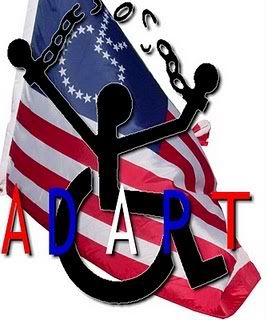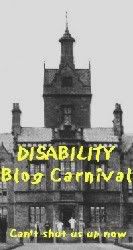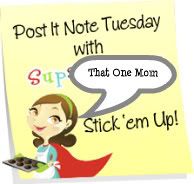
[image description: the disabled & proud logo--black rectangle, purple boarder, white writing]
I mentioned in a previous post that I found out that a bill was being introduced into the Maryland Legislature in favor of Disability Rights/History education in schools. I wish I could have done a bit more for this, and I wish I could have skipped class and gone to testify in person, but I did the best I could, and in fact, I think I went overboard... Can someone tell me how to rein in the passion?
--------------------------------------------------------------------
Testimony in SUPPORT HB 281
Health and Governmental Operations
And
Ways and Means Committees
By Cheryl *censored*
My name is Cheryl *censored*. I am a senior Family Studies Major at
I support HB281 for 2 reasons. The first and most important reason is the bill’s emphasis on educating K-12 students and the pride and understanding that will instill in our youth. The second reason is because I was very excited to read that the state’s public colleges and universities were included in the bill as well.
For about a year, I poured my heart and soul into creating a three hour disability awareness workshop for 120
Family studies majors graduate prepared to work in a variety of human services jobs. Many of my fellow graduates will end up working front lines with children and/or families touched by disabilities, and to say I was frightened by my vision of that would be an understatement. I knew my department wasn’t doing a good job preparing graduates to work with this population so I took it upon myself to undertake a very long and overwhelming independent study.
Preliminary data from that initial workshop shows overwhelmingly how well it worked. Students responded that they learned things such as disability etiquette, the impact of disability on the individual and family, and the need to view each person as an individual, among other things. The workshop was viewed by the Family Studies Department and other associated Towson University departments (Disability Support and Towson University Outreach) as such a success that it is offered as an independent study to a senior Family Studies student annually. The Oct 2010 workshop will be the 3rd annual. It is my greatest wish that something such as this can be replicated on all of the campuses across the state and attended by every student in a human services major.
My Evolving Disability Pride and Empowerment
As you see below, I have wondered who my peers are since I was a child. All people identify with people who are most like them. Now that I’m an adult, am about to graduate from college, and am involved in the disability rights movement I am finally able to dual identify. I tell people I am bi-cultural. I have friends and peers who are struggling through my Senior Seminar class with me, as well as other academic experiences, but who may or may not have a disability. I also have friends and peers who have spent time in Rosewood or various nursing facilities, who are activists here today for Developmental Disabilities Day, and whom you may think are nothing like me but are often more like me than anyone else. I am comfortable being me and I ache for others who are not yet that comfortable being different.
What Disability Awareness Month Means to Children
I was born premature which resulted in a diagnosis of spastic triplegia cerebral palsy (CP) and in 2007 I was diagnosed with bipolar II disorder. When I was growing up I went to hours and hours of physical, occupational, and speech therapy, as well as therapeutic horseback riding, and at times swim therapy and massage therapy. I couldn’t walk independently until I was 4 and then I had 7 surgeries between ages 5 and 19 which required more hours of therapy and adaptive equipment such as orthotics, wheelchairs, crutches, and walkers, and time away from school and peers.
PEERS Who are my peers? Who were my peers? I wish I knew…
Although my CP related motor skills issues and my later psychological issues impacted my school performance greatly, my disabilities have not impacted my intellectual capabilities at all. I was mainstreamed starting in kindergarten and enrolled in Advanced Placement classes in high school. I’m planning on pursuing multiple masters degrees, and maybe a PhD. I was never in school with other kids with significant disabilities. I was the only kid with a physical disability in my elementary school and later was the most disabled person to ever be in honors/AP classes in my high school. Everyone else in my high school with a physical disability was in special ed.
While this was academically appropriate, it turned out to be far from ideal. It fed me a very detrimental message. My “peers” were all non-disabled kids. As young as 7 I began to become ashamed of my disability and wanted to hide it from them. I didn’t want to be seen in public in my wheelchair, or worse, near anyone else I knew who used one. To me, having a disability automatically meant that you’re intellectually disabled. I knew I wasn’t like my “peers” because they didn’t go to therapy 3 days a week after school and I didn’t go to ballet or swim team like my best friends. I also knew I wasn’t like the kids I knew in special ed. So I was peer-less and in limbo most of my life, not wanting to identify as a person with a disability, but not able to fake my way into passing as a person without a disability.
My understanding of Black History and Hispanic History months (I am neither African American nor Hispanic) and the emphasis on teaching about great African American and Hispanic leaders is to instill a sense of pride in young African American and Hispanic students and to give them role models to aspire to. For other students, teaching about famous minority leaders helps present a more well-rounded picture of history. For both groups of students, teaching about minority leaders helps to dispel racist beliefs that we all hold.
Well what about famous disabled leaders? People with disabilities identify as a distinct minority culture as well. We have our own literature, idioms, and customs. We also have our own prejudice, ableism. With 18% of the country being classified as having a disability we represent a larger segment of the population than African American or Hispanics. Our culture encompasses these groups as well. Disability knows no ethnic, racial, or economic boundary.
So why don’t we teach disability rights history in schools? It seems more then obvious to me. I know who Martin Luther King Jr, Rosa Parks, and Frieda Kalo are. I’m sure you do too. I also know who Ed Roberts and Diane Coleman are. Do you? Ed Roberts was one of the founders of the disability rights movement. He obtained a degree from UC Berkley, started the independent living movement, and in the 1970s led a month long protest to get the terms of the rehabilitation act instated. He was on an iron lung. Diane Coleman works for a large independent living center and founded a very large, very well known, and very successful national disability rights organization. She’s a lawyer and she’s also in a wheelchair. What about Michael Phelps even? Everyone knows who he is, but do you also know he has ADHD? Here are 3 examples of successful people with significant disabilities. There are many more.
When I was 15 I was suicidal because I was despondent over being different. I know of other people as well. I didn’t have a MLK or Frieda Kalo to look up to. I didn’t hear about Ed Roberts or Diane Coleman until college. Recently I began to explain Ed Roberts and the independent living movement to my mom who was flabbergasted that she was an adult while all of this was going on and this was the first she had ever heard of him. MLK and Rosa Parks are household names. Maybe if Ed Roberts was a household name I wouldn’t have felt so marginalized from my “peers.”
I thank you from the bottom of my heart for your support of HB281 and the empowerment of the citizens of

















0 comments:
Post a Comment